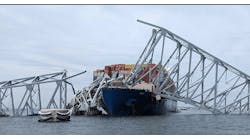Welcome to a new year of opportunities to restore the weak links in your suit of shining armor. January gives each of us as individuals an opportunity to work on those links, but rarely do we have anybody breathing down our necks to complete our repairs. That's why many such efforts fail by February.
But you, as a supply chain professional, are equipped to be better with resolutions. You're probably part of many such efforts during the course of any year. And if you're not, at least you're exposed to success stories that will inspire your future efforts. Let me start your year with a good one I just read about in the Wall Street Journal— and kudos to the Journal for joining us in recognizing supply chain excellence.
The spotlight falls on Boeing in this case. Demand for more fuel efficient jets, and more jets in general to provide more service into Asia and the Middle East, is putting pressure on this aircraft manufacturer to speed up and improve its own manufacturing processes as well as those of its suppliers. To do that, it is sending out teams of supply chain experts to the sites of its suppliers to supervise and consult with them to improve their quality and efficiency.
Boeing wants to avoid the problems it had the last time it ramped up production during the introduction of its first 787 Dreamliners. The WSJ story concluded that Boeing wants its supply chain to learn from a time when it delivered the first of these new jets more than three years late—“because of [Boeing's] failure to carefully manage its supply chain early on.”
But here's a question WSJ didn't answer: what does Boeing intend to do with the aircraft these new jets are replacing? Boeing has already positioned itself as a Corporate Citizen, dedicated to environmental stewardship. In its 2011 Environmental Report, Boeing said it has made major changes in contracting language and expanded the use of environmental criteria in evaluating and selecting suppliers.
“Besides being able to provide high-quality aerospace parts on time and within budget, we also look to our suppliers to maximize the use of recycled materials, minimize hazardous waste, conserve energy and prevent pollution,” the report reads. “In addition, we launched a pilot program to include environmental reviews as a standard part of Boeing's ongoing quality inspections at suppliers.”
Your supply chain doesn't have to make airplanes to make an environmental difference. There are new potential partners sprouting up to help you. One that's just getting the word out about itself is Repurposed Materials, which is dedicated to searching all industrial supply chains for byproducts that could be candidates for “repurposing.”
The company defines “repurposed materials” as those that have value “as is” to a second, unrelated industry. If it determines there is a “repurpose” market for an asset, it then negotiates the transfer of said asset for eventual re-sale to its customer base.
Examples include old conveyor belts turned into floor matting for work areas, used rubber roofing membrane made into pond liners, retired wine barrels “repurposed” as trash cans and old street sweeper brushes offering comfort to livestock as back scratchers.
Maybe the economy-class seats from some of those retired jetliners can be repurposed as easy chairs—for our daughters' dollhouses.
Just kidding, Boeing. Kinda.


